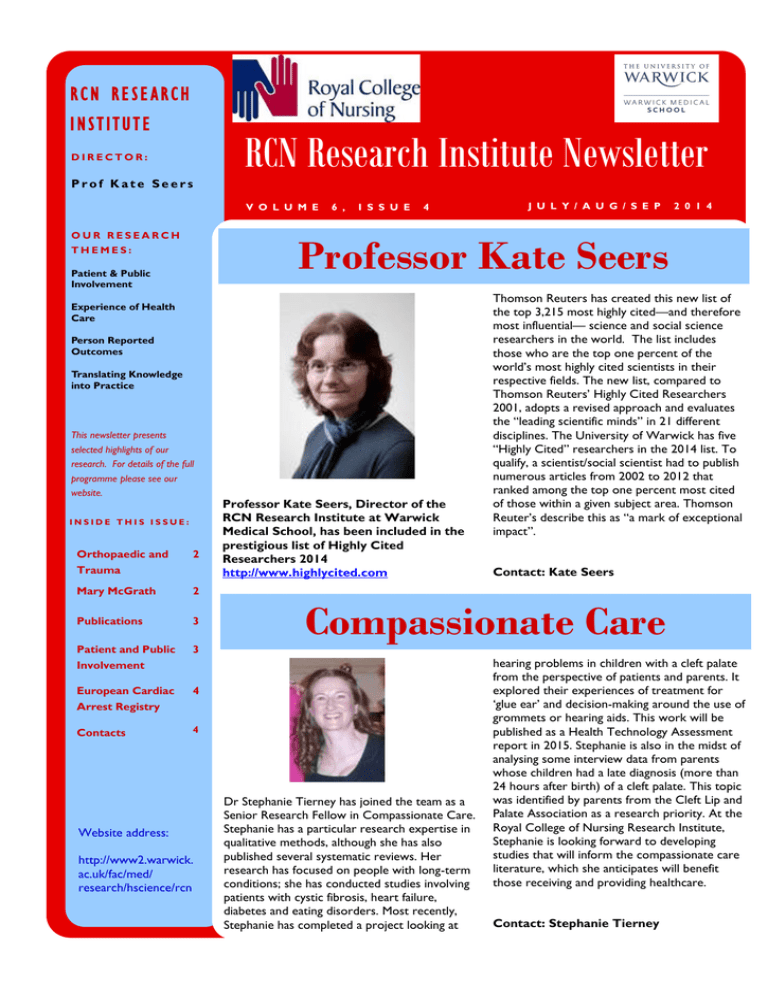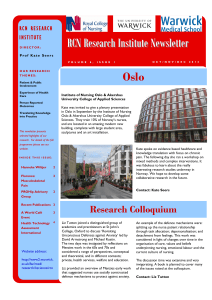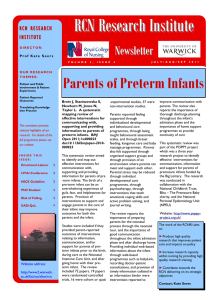RCN Research Institute Newsletter Professor Kate Seers
advertisement

RCN RESEARCH INSTITUTE RCN Research Institute Newsletter DIRECTOR: Prof Kate Seers V O L U M E OUR RESEARCH THEMES: 6 , I S S U E 4 J U L Y / A U G / S E P 2 0 1 4 Professor Kate Seers Patient & Public Involvement Experience of Health Care Person Reported Outcomes Translating Knowledge into Practice This newsletter presents selected highlights of our research. For details of the full programme please see our website. INSIDE THIS ISSUE: Orthopaedic and Trauma 2 Mary McGrath 2 Publications 3 Patient and Public Involvement 3 European Cardiac Arrest Registry 4 Contacts 4 Website address: http://www2.warwick. ac.uk/fac/med/ research/hscience/rcn Professor Kate Seers, Director of the RCN Research Institute at Warwick Medical School, has been included in the prestigious list of Highly Cited Researchers 2014 http://www.highlycited.com Thomson Reuters has created this new list of the top 3,215 most highly cited—and therefore most influential— science and social science researchers in the world. The list includes those who are the top one percent of the world’s most highly cited scientists in their respective fields. The new list, compared to Thomson Reuters’ Highly Cited Researchers 2001, adopts a revised approach and evaluates the “leading scientific minds” in 21 different disciplines. The University of Warwick has five “Highly Cited” researchers in the 2014 list. To qualify, a scientist/social scientist had to publish numerous articles from 2002 to 2012 that ranked among the top one percent most cited of those within a given subject area. Thomson Reuter’s describe this as “a mark of exceptional impact”. Contact: Kate Seers Compassionate Care Dr Stephanie Tierney has joined the team as a Senior Research Fellow in Compassionate Care. Stephanie has a particular research expertise in qualitative methods, although she has also published several systematic reviews. Her research has focused on people with long-term conditions; she has conducted studies involving patients with cystic fibrosis, heart failure, diabetes and eating disorders. Most recently, Stephanie has completed a project looking at hearing problems in children with a cleft palate from the perspective of patients and parents. It explored their experiences of treatment for ‘glue ear’ and decision-making around the use of grommets or hearing aids. This work will be published as a Health Technology Assessment report in 2015. Stephanie is also in the midst of analysing some interview data from parents whose children had a late diagnosis (more than 24 hours after birth) of a cleft palate. This topic was identified by parents from the Cleft Lip and Palate Association as a research priority. At the Royal College of Nursing Research Institute, Stephanie is looking forward to developing studies that will inform the compassionate care literature, which she anticipates will benefit those receiving and providing healthcare. Contact: Stephanie Tierney PAGE 2 Orthopaedic and Trauma Conference Riding the waves: current trends in orthopaedic and trauma care. RCN Society of Orthopaedic and Trauma Nursing International Conference and Exhibition 2014 Liz Tutton (RCNRI, Trauma Research), Susanna Symonds (Research Nurse, Trauma Research, Oxford) and Julie Wright (Nurse Consultant, Trauma Unit, Oxford) all gave papers at the conference that was held in Brighton. Liz Tutton provided evidence to support the importance of patient experience within the context of developing practice. She drew on current studies of patient experience of traumatic injury and placed it within the context of emotional labour. Susanna Symonds presented a paper on the challenges of maintaining a research culture in trauma. She identified the historical development of research in trauma and raised challenges in relation to recruitment, funding and creating a sustainable research culture. Julie Wright explored the role of the nurse consultant: assessing the impact one year on. She presented evidence of the strengths and challenges within the role and the benefits within the evolution of Major Trauma Networks. The conference was stimulating and raised many issues around the evolution of the role of orthopaedic and trauma nurses. The way forward was identified in relation to leadership, developing expertise and improving the knowledge base for practice. Contact: Liz Tutton Susanna Symonds, Julie Wright, Liz Tutton Mary McGrath PhD We are delighted to announce that Mary McGrath, Lecturer in the School of Nursing, Midwifery and Health Systems at University College Dublin has been awarded her PhD. Mary was supervised by Professor Kate Seers and Dr Liz Tutton. Her study explored junior nurses’ experiences of providing care within intensive care units (ICUs) where there is a high level of technology. The study was underpinned by Heideggerian phenomenology using in-depth qualitative interviews. A purposeful sample of 20 junior Irish ICU nurses were interviewed. Data were analysed through the identification of codes categories and themes. drawing on pre-existing caring skills. ‘Knowing and caring in the technological environment’ demonstrated the interrelationship of expressive caring with knowing the patient’s bodily responses; the latter an aspect that came to the fore in the current study. ‘Mastering technology’ identified competence as a maturation process in which nurses moved between being competent and being a novice depending on the type of Three main themes emerged; ‘challenging environment’, ‘knowing and caring in the technological environment’ and ‘mastering technology’. The theme ‘challenging environment’ identified how nurses struggled to cope with the stress engendered by technological caring; they were concerned about their competence and about patient safety. They felt more comfortable when RCN RESEARCH INSTITUTE technology and the nature of the caring event. This process required support from the multidisciplinary team. Mary is very pleased to have finished studying and is looking forward to some free time. The findings of the study will be published in due course. Contact: Kate Seers mary.t.mcgrath@ucd.i.e Kate Seers, Mary McGrath, Liz Tutton VOLUME 6, ISSUE PAGE 4 Publications Brett J. Staniszewska S. Mockford C. Herron-Marx S. Hughes J. Tysall C. Suleman R. (2013). A systematic review of the impact of patient and public involvement on service user, researchers and the community. The Patient: Patient Centred Outcomes. Doi: 10.1007/ s40271-014-0065-0 Toye F. Seers K. Barker K. (2014). A meta-ethnography of patients’ experiences of chronic pelvic pain: struggling to construct chronic pelvic pain as ‘real’. Journal of Advanced Nursing. Doi:10.1111/jan.12485 Jones E. Williams-Yesson B. Hackett R. Staniszewska S. Evans D. Francis N. (2014). Quality of reporting of patient and public involvement within surgical research: a systematic review. Annals of Surgery. June 19 Doi: 10.1097/SLA0000000000000768 The RCN Research Institute, within the Division of Health Sciences, Warwick Medical School at the University of Warwick, provides a vibrant student research community. If you are interested in undertaking a PhD, part time or full time, please contact: Prof Kate Seers. Patient and Public Involvement Palliative Care. Sophie Staniszewska attended the European Association for Palliative Care (EAPC) Conference in Lleida, Spain in June 2014. The aim of the Association is to promote palliative care in Europe, for health care providers, professionals and others. Sophie presented a poster on the EURECA study, which examined emergency admission by patients with advanced chronic obstructive pulmonary disease (COPD) and lung cancer. EURECA was a collaborative study conducted by Warwick and Birmingham Universities, led by Dr Dan Munday, a consultant in palliative care, now based in Nepal. Sophie focused on the contribution of patient and public involvement (PPI) in the study, with the aim of identifying the nature and impact of PPI. Sophie was also part of two other posters presented by Dan Munday and Cara Bailey (Birmingham) in collaboration with the EURECA research team. Health Technology Assessment. Sophie Staniszewska attended the health technology assessment international (HTAi) 11 th Annual Meeting in Washington in June 2014 which focused on a number of key themes including putting the patient and public in the centre. HTAi is the global scientific and professional society for health technology assessment. It includes researchers, agencies, policymakers, industry, academia, health service providers, patients/consumers and other stakeholders. Sophie is a member of the HTAi Patient and Citizen Involvement Special Interest Group and is co-chair of the Methods and Impact sub-group. The conference included a stream focusing on patient and public involvement, including the annual face-to-face meeting of the Patient and Citizen Involvement Group, a great opportunity to develop PPI networks across the 65 member countries of HTAi over six continents and develop international good practice. Sophie also presented on the development of GRIPP 2, guidance for enhancing the quality and transparency of PPI reporting in published papers. RCN RESEARCH INSTITUTE Lieida, Spain The White House Contact: Sophie Staniszewska 3 PAGE 4 European Cardiac Arrest Registry Patient Reported Outcomes and the European Cardiac Arrest Registry (EuReCa) A successful outcome following a cardiac arrest has been conceptualised as the ‘chain of survival’; the final link recognises the importance of restoring quality of life to survivors. However, guidance for appropriate patient-centred assessment of ‘life’ following cardiac arrest is absent, and little is known about which outcomes are most important to survivors. EuReCa is a Europewide collaboration which seeks to record and analyse cases of cardiac arrest; the focus of the current registry is on process and clinical outcome, including survival. However, the ‘survivors’ perspective’ is not assessed. In recognition of her experience with patient-reported outcomes (PRO), Dr Haywood has been invited to contribute to discussions about the future content of the EuReCa registry and has participated in several working days during 2014 – hosted in Hamburg and Bilbao (http://www.eurecaone.eu/). An associated editorial, written in collaboration with Professor Gavin Perkins (CTU) and Laura Whitehead (PhD student, WMS) has recently been published in Resuscitation. Delegates at the EuReCa-One meeting in Hamburg Kirstie Haywood, bottom row second left Haywood KL. Whitehead L. Perkins GD. (2014) The psychosocial outcomes of cardiac arrest: relevant and robust patient-centred assessment is essential. Resuscitation. Jun;85(6):718-9 Contact: Kirstie Haywood Graduation 2014 RCN Research Institute RCNRI Staff and Email Contacts: Lee Gunn kathleen.gunn@warwick.ac.uk Division of Health Sciences Dr Kirstie Haywood k.I.haywood@warwick.ac.uk Warwick Medical School Dr Carole Mockford c.mockford@warwick.ac.uk University of Warwick Claire New c.e.new@warwick.ac.uk Prof Kate Seers kate.seers@warwick.ac.uk COVENTRY CV4 7AL Dr Sophie Staniszewska sophie.staniszewska@warwick.ac.uk Dr Stephanie Tierney s.tierney@warwick.ac.uk Dr Liz Tutton liz.tutton@warwick.ac.uk RCNRI Research Team Administrator: Paul Kent Phone: 024 761 50618 RCNRI Website Address: http://www2.warwick.ac.uk/fac/med/research/hscience/rcn/ email: p.d.kent@warwick.ac.uk



